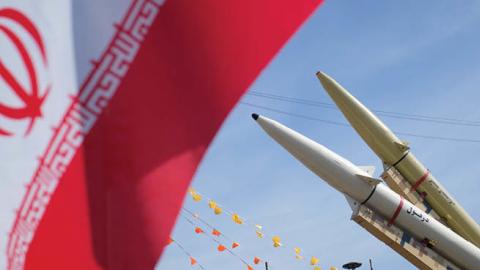The leverage gained through economic sanctions has once again brought Iranian leadership to the negotiating table in Vienna—but that is not the end of sanctions’ utility. This leverage will be essential to secure the longer and stronger1 deal nearly everyone agrees is required to effectively prevent the Islamic Republic from getting a nuclear weapon. In fact, absent these sanctions such a deal is practically impossible to envision. Lifting sanctions before validating the change in behavior that required them in the first place endangers our national security, undermines the legitimacy of our authorities, erodes the impact of a vital tool with broad bipartisan support, and exposes our actions to an unnecessary legal challenge.
The US has developed a myriad of tools with which to address the challenge of terrorism. There is currently debate over our sanctions’ authorities, which are employed to expose and impose accountability for Iran’s use of terrorism as a tool of statecraft. For example, the Biden administration recently revoked the Foreign Terrorist Organization (FTO) and Specially Designated Global Terrorist (SDGT) designations for the Houthis;2 the stated reason was to preserve the flow of humanitarian assistance to Yemen’s suffering people and to enable negotiations for a ceasefire and eventual peaceful resolution of the conflict in Yemen.
As radical Islamist proxies of Tehran, the Houthis did not respond to this conciliatory gesture by easing restrictions on the basic necessities of life flowing into Yemen through Houdeidah port, which they control. Instead, they strengthened the blockade and ramped up attacks on civilian infrastructure in Saudi Arabia. The Department of State has been put in the unfortunate position of having to release statement after statement condemning the terrorist activities of the group it just removed from the FTO list. This situation offers a cautionary tale about the likely results of reversing such a designation for reasons other than the actual cessation of terrorist activities. In any case, the authorities governing both sanctions are again being threatened by the willingness of the Biden administration to consider delisting the Houthis’ Iranian sponsors.
At this point it may be worth asking if there is a world in which the conduct of terrorism (or material support enabling its conduct3) could be excused. Even if an alternative method of exposing terrorism and holding terrorists accountable is selected— and none have been proffered —what do we gain if we determine sanctionable activity is unacceptable to one administration and acceptable to another? Understandably, each administration may employ sanctions with discretion, but the reversal of a judgment by a previous administration absent a significant body of evidence to support the decision undermines the authority itself. That’s why it’s almost never done.
Iranian entities designated under terrorism authorities were identified following an exhaustive process establishing that “they have enabled act of terrorism.” 4 It is difficult to comprehend why we would entertain Iran’s demand to waive sanctions for entities that continue to threaten our national security without first confirming the threat no longer exists via a process as valid as the original designations.
The Biden administration may choose not to apply pressure or hold Iran accountable through sanctions, though the previous administration made sanctions part of its strategy for enabling negotiations with Tehran and denying Tehran access to resources. But as there is currently no strategy for dealing with Iran, and the Joint Comprehensive Plan of Action (JCPOA) is not a substitute for one, designations remain a vital constraint on Iran’s persistent acts of terrorism. They are not intended to be annulled as a matter of political discretion but rather only on the basis of fact in each individual case.
Under this administration, our sanctions are already suffering from a lack of enforcement,5 which erodes the leverage required to enter into and successfully conclude negotiations. This is a terrible precedent.6 Wholesale sanctions relief also reduces leverage and disincentivizes compromise, which may in turn impede diplomatic progress toward a longer and stronger deal. It is reckless to remove designations without first securing our objectives and confirming the conditions for removal have been satisfied. Doing so undermines our sanctions regimes and authorities that are vital to our national security.
How then should the United States balance diplomatic efforts to achieve our vital national interests with the imperatives to preserve required leverage and the authorities that underpin them?
While the current administration may be exclusively focused on Iran’s nuclear program, those of us who served in the Trump administration sought to address all of Iran’s malign influence: its conduct of and support for terrorism, proliferation, long-range ballistic missile development, and gross human rights violations. The over 1,600 designations we processed wrought far more leverage than the mere 730 produced by the previous three presidential terms of Obama and Bush combined. These sanctions not only disrupted Iran’s surrogates and proxies;7 they also achieved unprecedented economic leverage,8 resulting in a 23 percent overall drop in Iran’s GDP, three consecutive years of negative GDP growth (the largest decline since 1983), an 84 percent drop in oil exports in two years (to the lowest levels in Iran’s history), a 58 percent drop in oil production in two years (the lowest levels its history), a record exchange rate for the rial (which climbed from 4,000 toman to 25,000 toman in two years), a current account balance at -40 percent (the lowest in its history), and less than $4 billion in accessible foreign exchange reserves—a drop from over $112 billion in 2017 (the lowest in history).9 The overall result is a $250 billion loss in overall economic impact.10
A further result of the previous sanctions is that over $331 million of Iran’s funds and over $44 million of Hizballah’s funds were blocked in just two years (between 2017 and 2019). In comparison, just $95.7 million was blocked for Iran and $35.2 million was blocked for Hizballah in the four years between 2012 and 2016.11
The administration should develop a comprehensive strategy to address the full range of interconnected threats Iran poses to our vital national security interests and to those of our partners and allies.12 All of the available instruments of national power could then be applied to the threats to guide and inform their implementation, including but not limited to diplomatic efforts and negotiations. Development of a comprehensive strategy should be done in full consultation with our partners and allies, upon whom we depend to coordinate execution, and mindful that their interests are threatened as well.
Before revoking designations, the administration should follow the process for employing sanctions and conduct an intelligence community assessment, in collaboration with the Departments of Justice and Homeland Security, to confirm that the conditions that originally prompted the designation are no longer present. As the negotiations to identify conditions necessary to return to compliance with the 2015 JCPOA continue, all sanctions outside the scope of Iran’s nuclear activities should be excluded. If Tehran persists in seeking relief beyond the bounds of JCPOA, we should respond by pursuing a new and comprehensive deal that encompasses the totality of Iran’s malign behavior.
Congress should immediately modify the statute13 governing requests for delisting countries as State Sponsors of Terrorism to require that the administration apply the reverse of the listing procedure; this would safeguard the authority of our terrorism sanctions from legal challenge. Alternatively, Congress could require the process for delisting to apply to both requesting entities and the government. Congress could also require the consolidation of annual reports to address the validity of the removals and assess the risk if the conduct that prompted the designations persists.
To preserve the authority and intent behind the law governing the designation of Foreign Terrorist Organizations,14 Congress should require the same rigor to remove the designation of State Sponsors of Terrorism as to impose it.15
The US should pursue its vital interests without compromise, and these are not limited to denying Iran all paths to a nuclear weapon. Iran should not “enjoy the benefits” until these objectives are secured.16 It is more reasonable to demand that Tehran stop using its oil revenue to fund terrorism, proliferation, and gross violations of human rights first.
So long as Iran’s ministries, oil industry, and banks remain slush funds for the Islamic Revolutionary Guards Corps and its terrorist militias at the expense of the Iranian people, we should enforce our sanctions, not abandon them. The latter would be an egregious affront to the memory of 603 US service members killed in Iraq by Iranian-backed militias—amounting to 17 percent of our casualties in Iraq from 2003 to 2011—and to their families.17 Their memory, and our authorities to hold accountable those responsible, deserve no less than that sanctions be preserved.















